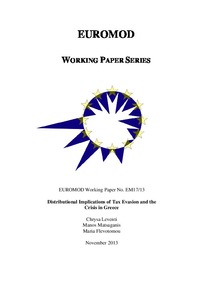Distributional implications of tax evasion and the crisis in Greece
"<span style="font-size: 11px;">The current Greek crisis and the government’s fiscal consolidation effort have elevated tax evasion to one of the most crucial policy issues in the domestic debate. The paper attempts to shed light on one aspect of the phenomenon, namely...
| Main Authors: | , , , |
|---|---|
| Institution: | ETUI-European Trade Union Institute |
| Format: | TEXT |
| Language: | English |
| Published: |
Colchester
2013
ISER |
| Subjects: | |
| Online Access: | https://www.labourline.org/KENTIKA-19122454124919406369-Distributional-implications-of.htm |
| Summary: | "<span style="font-size: 11px;">The current Greek crisis and the government’s fiscal consolidation effort have elevated tax evasion to one of the most crucial policy issues in the domestic debate. The paper attempts to shed light on one aspect of the phenomenon, namely its distributional implications. We compare a large panel data sample of personal income tax returns in 2006-2010 (incomes earned in 2005-2009) with data from the European Union Survey of Income and Living Conditions of the same years. We show that the deviation of incomes between the two data sources is greater in the case of farming and self-employment income. Based on these findings we then calculate stylised factors of income under-reporting by income source. These factors are fed into a tax-benefit microsimulation model to provide tentative estimates of the size and distribution of income tax evasion in Greece in 2009. We estimate income under-reporting at 12.2%, resulting in a shortfall in personal income tax receipts of 29.7%. The paper shows that the effects of tax evasion in Greece are higher income inequality and much lower progressivity of the income tax system."</span> |
|---|---|
| Physical Description: | 14 p . Digital |

